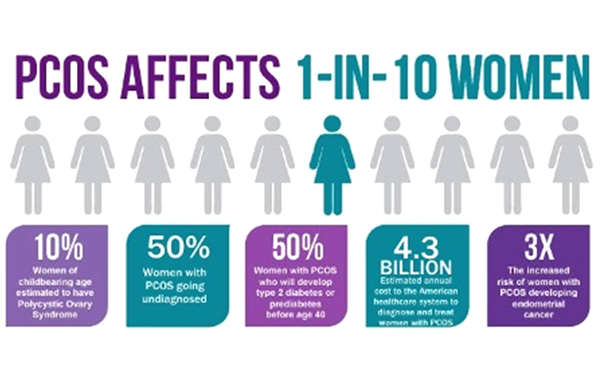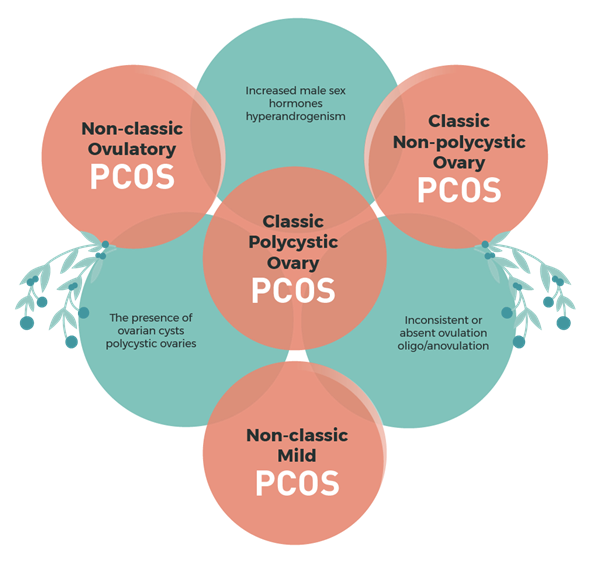Polycystic Ovarian Syndrome

Polycystic ovary syndrome (PCOS) is a health problem that affects 1 in 10 women of childbearing age. PCOS is also a common and treatable cause of infertility.
Polycystic ovary syndrome (PCOS), also known as polycystic ovarian syndrome, is caused by an imbalance of reproductive hormones. The hormonal imbalance creates problems in the ovaries. The ovaries make the egg that is released each month as part of a healthy menstrual cycle. With PCOS, the egg may not develop as it should or it may not be released during ovulation as it should be.
Symptoms

- Irregular menstrual cycle. Women with PCOS may miss periods or have fewer periods (fewer than eight in a year). Or, their periods may occur every 21 days or more often. Some women with PCOS stop having menstrual periods.
- Hirsutism-Too much hair on the face, chin, or parts of the body
- Reduced Fertility
- Acne on the face, chest, and upper back
- Thinning hair or hair loss on the scalp, male-pattern baldness
- Weight gain or difficulty losing weight
- Darkening of skin, particularly along neck creases, in the groin, and underneath breasts
- Skin tags, which are small excess flaps of skin in the armpits or neck area
PCOS can cause missed or irregular menstrual periods. Irregular periods can lead to:
- Infertility (inability to get pregnant). In fact, PCOS is one of the most common causes of infertility in women.
- Development of cysts (small fluid-filled sacs) in the ovaries.
What causes PCOS?

The exact cause of PCOS is not known. Most experts think that several factors, including genetics, play a role:
- High levels of androgens – Androgens are sometimes called “male hormones,” (Example: Testosterone) although all women make small amounts of androgens. Women with PCOS have more androgens than normal. Higher than normal androgen levels in women can prevent the ovaries from releasing an egg (ovulation) during each menstrual cycle, and can cause extra hair growth and acne.
- High levels of Insulin – Insulin is a hormone that controls the level of glucose (a type of sugar) in the blood. Sometimes the body may not respond to insulin (this is known as insulin resistance), As a result, your insulin blood levels become higher than normal. High levels of insulin can lead to weight gain, irregular periods, fertility problems and higher levels of testosterone which may cause PCOS.
Diagnosis
- Physical exam – The doctor will measure your blood pressure, body mass index (BMI), and waist size. They will also look at your skin for extra hair on your face, chest or back, acne, or skin discoloration. They may look for any hair loss or signs of other health conditions (such as an enlarged thyroid gland).
- Pelvic exam – The doctor may do a pelvic exam for signs of extra male hormones (for example, an enlarged clitoris) and check to see if your ovaries are enlarged or swollen.
- Pelvic ultrasound (sonogram) – This test uses sound waves to examine your ovaries for cysts and check the endometrium (lining of the uterus or womb).
- Blood tests – Blood tests check your androgen hormone levels, sometimes called “male hormones.” The doctor will also check for other hormones related to other common health problems that can be mistaken for PCOS, such as thyroid disease. Your doctor may also test your cholesterol levels and test you for diabetes.
Treatment
The symptoms of PCOS can be easily managed with proper medications and a healthy lifestyle. The doctors will work on a treatment plan based on your symptoms, your plans for having children, and your risk of long-term health problems such as diabetes and heart disease.

Source: Office on Women’s Health in the U.S. Department of Health and Human Services